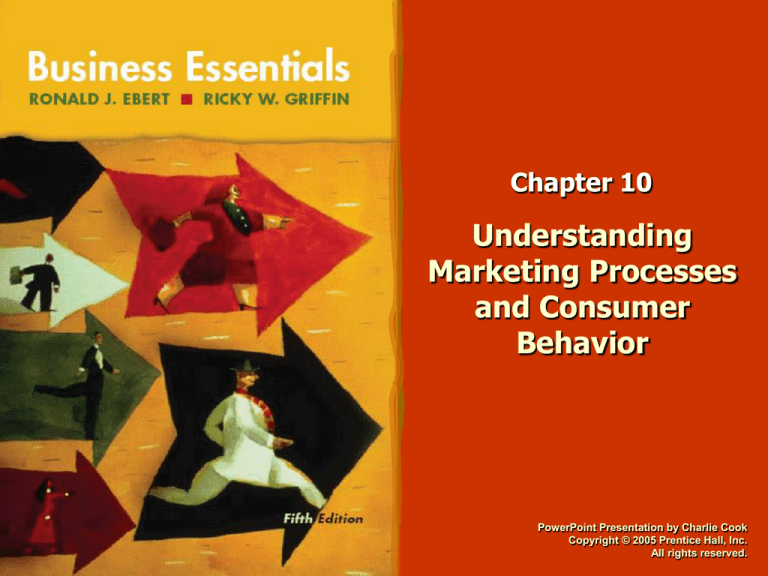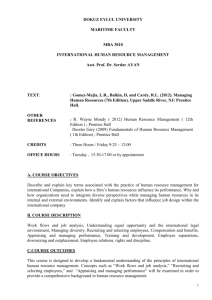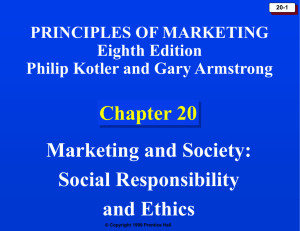
Chapter 10
Understanding
Marketing Processes
and Consumer
Behavior
PowerPoint Presentation by Charlie Cook
Copyright © 2005 Prentice Hall, Inc.
All rights reserved.
Key Topics
• Definition of marketing
• The external marketing environment
• Segmentation and target marketing
• The consumer buying process
• Organizational markets and buying behavior
• Consumer and industrial products
• Branding and packaging
Copyright © 2005 Prentice Hall, Inc. All rights reserved.
10–2
What Is Marketing?
“Planning and executing the conception, pricing,
promotion, and distribution of ideas, goods, and
services to create exchanges that satisfy
individual and organizational objectives”
OR
Finding a need and filling it!
Copyright © 2005 Prentice Hall, Inc. All rights reserved.
10–3
The Influence of Marketing Permeates
Everyday Life
• Goods
Consumer
Industrial
• Services
• Ideas
Relationship marketing
emphasizes lasting
relationships with
customers and suppliers
Copyright © 2005 Prentice Hall, Inc. All rights reserved.
10–4
The Competitive Environment
Drives Marketing Decisions
• Substitute product competition
• Brand competition
• International competition
Copyright © 2005 Prentice Hall, Inc. All rights reserved.
10–5
Marketing Mix: The “Four P’s”
roduct
ricing
lace
romotion
(Distribution)
Copyright © 2005 Prentice Hall, Inc. All rights reserved.
10–6
The Promotional Mix
Personal
Selling
Advertising
Sales
Promotions
Copyright © 2005 Prentice Hall, Inc. All rights reserved.
Public
Relations
10–7
Market Segmentation and Target
Marketing
• Market Segmentation
Dividing a market into customer
categories
• Target Marketing
Selecting a category of
customers with similar wants
and needs who are likely to
respond to the same products
Copyright © 2005 Prentice Hall, Inc. All rights reserved.
10–8
Identifying Market Segments
Geographic Demographic
Variables
Variables
Psychographic
Variables
Copyright © 2005 Prentice Hall, Inc. All rights reserved.
10–9
Consumer Behavior
• Psychological Influences
• Personal Influences
• Social Influences
• Cultural Influences
Why do consumers
purchase and
consume products?
Copyright © 2005 Prentice Hall, Inc. All rights reserved.
10–10
Organizational Markets
Industrial
Market
Reseller
Market
Government and
Institutional Market
Copyright © 2005 Prentice Hall, Inc. All rights reserved.
10–11
Organizational Buying Behavior
• Differences in buyers
Professionals
Specialists
Experts
• Differences in buyer/seller
relationships
Copyright © 2005 Prentice Hall, Inc. All rights reserved.
10–12
Classifying Products
• Consumer
Convenience Goods
Shopping Goods
Specialty Goods
Copyright © 2005 Prentice Hall, Inc. All rights reserved.
• Industrial
Expense Items
Capital Items
10–13
Product Offerings
• Product Line
A group of similar products, intended for similar
buyers, who will use them in similar ways.
• Product Mix
The total group of products that a company offers
for sale.
Copyright © 2005 Prentice Hall, Inc. All rights reserved.
10–14
Developing New Products
• The New Product Development Process
• Product Mortality Rates
Strategy of introducing new products to respond
quickly to customer or market changes
Copyright © 2005 Prentice Hall, Inc. All rights reserved.
10–15
Creating Product Brands
• Branding
Using symbols to communicate the qualities of a
given product to create loyal consumers
• Types of Brands:
National Brands
Licensed Brands
Private Brands
Copyright © 2005 Prentice Hall, Inc. All rights reserved.
10–16
Product Packaging
• Attracts consumers
• Displays brand name
• Protects contents
• Supplies information
• Communicates features and
benefits
• Provides features and
benefits (e.g. easy pour
spout)
Copyright © 2005 Prentice Hall, Inc. All rights reserved.
10–17
The International Marketing Mix
PRODUCTS
DISTRIBUTION
Copyright © 2005 Prentice Hall, Inc. All rights reserved.
PRICING
PROMOTION
10–18
Small Business and the Marketing Mix
• Products
• Pricing
• Promotion
• Distribution
Copyright © 2005 Prentice Hall, Inc. All rights reserved.
10–19
Chapter Review
• Define marketing.
• Describe the forces of the external marketing
environment.
• Explain market segmentation and target
marketing.
• Describe the consumer buying process.
• Discuss the organizational market categories.
Copyright © 2005 Prentice Hall, Inc. All rights reserved.
10–20
Chapter Review (cont’d)
• Define product and distinguish between
consumer and industrial products.
• Explain the importance of branding and
packaging.
Copyright © 2005 Prentice Hall, Inc. All rights reserved.
10–21






